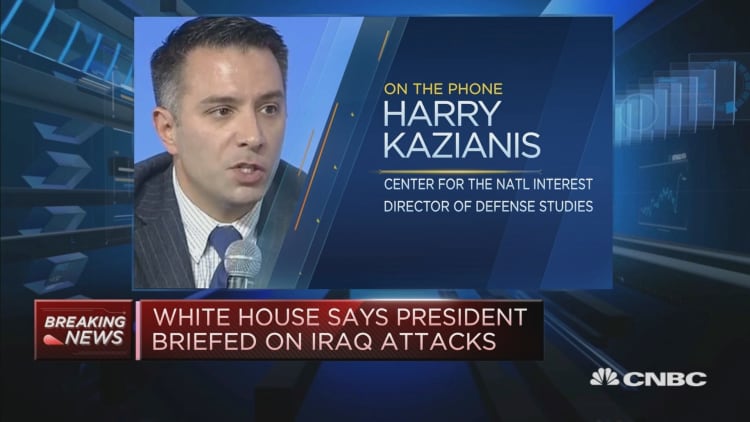
Iran's attack on Iraqi bases hosting U.S. troops is aimed at showing "they can basically reach out and do some damage," said Harry Kazianis, director of defense studies at the Center for the National Interest.
In retaliation over the targeted killing of a top Iranian military commander, Iran on Wednesday morning local time fired ballistic missiles at bases housing American forces in Iraq.
"We have to keep in mind that the Iranians have over 2,000 ballistic missiles," said Kazianis, warning that Iran's revenge should not be taken lightly.
"In fact, if the United States were trying to stop a ballistic missile attack from the Iranians, from all of them, we could not," he added. "Even if we moved every ballistic missile defense platform we have in the world to the Middle East, we would not be able to stop the Iranians," he told CNBC's "Street Signs" on Wednesday.
Kazianis said a full-frontal confrontation between Tehran and Washington could be "quite bloody." He added that Tehran can potentially "do a lot of damage, not only (to) U.S. bases but U.S. warships, all types of U.S. bases in the region."
Possible US responses
Asked if the rising tension between the U.S. and Iran in recent weeks amounts to war, the defense expert said, "I think right now, these are the prefaces of war. I think the real question now is: What do the Trump administration do in response to this?"
There could be two possible moves from the Trump administration, Kazianis said.
The Iranians, I think, want to show the world — and they want to show President Trump specifically — that they are no military lightweight.Harry Kazianisdirector of defense studies, Center for the National Interest
For one, the Trump administration could attack the "actual launchers that fired these missiles, that would certainly be proportional."
The other possibility is to "use this as an excuse to really go on a grand strategic military attack of Iran," he said. "That would take out all of Iran's nuclear facilities — missile facilities, missile production facilities, major bases."
He added that he doesn't think the U.S. is in a position to take the second option in the Middle East as it would take at least a few weeks to get the forces in the region ready.
"By then, Iran would have been able to launch a preemptive strike," Kazianis said.
He said his biggest worry now is that there are no signs of deescalation or an atmosphere for diplomacy.

Not everyone agrees.
Former U.S. ambassador to Oman, Richard Schmierer, told CNBC on Wednesday that the latest Iranian attacks "might be the opportunity — in the absence of casualties — for the two sides to now say: 'okay we have each done something, we can stand down.'"
Iran's military power
Kazianis said Tehran's decision to strike directly, instead of through its proxies, is because "the Iranians, I think, want to show the world — and they want to show President Trump specifically — that they are no military lightweight."
"The Iranians have been building ballistic missile technologies for years. In fact, I would argue that the Iranians are a ballistic missile superpower," he said.
He added that Iran has developed a set of capabilities that could even be "very hard" for a military powerhouse like the U.S. to respond to.
"I think they wanted to do this, they wanted to do this publicly. And they wanted to demonstrate to the United States, and to President (Donald) Trump that they are not going to be easy to fight in a war," Kazianis said.


